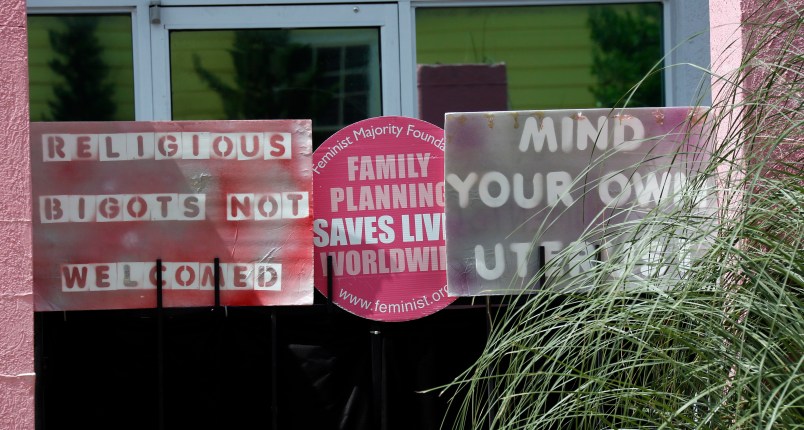MADISON, Wis. (AP) — A Wisconsin law that requires abortion providers to get admitting privileges at nearby hospitals is unconstitutional, a federal appeals court panel ruled Monday.
The 7th U.S. Circuit Court of Appeals panel’s 2-1 decision doesn’t put the question to rest. The U.S. Supreme Court agreed earlier this month to hear a challenge to a similar Texas law in a case that could settle the issue nationally.
The Wisconsin case centers on a lawsuit filed by Planned Parenthood and Affiliated Medical Services. The groups argue that the 2013 Republican-backed law amounts to an unconstitutional restriction on abortion.
The law’s supporters counter it ensures continuity of care if a woman developed complications from an abortion and needed to be hospitalized. But the lawsuit said the statute would force AMS’s clinic in Milwaukee to close because its doctors couldn’t get admitting privileges. That in turn would lead to longer waits at Planned Parenthood clinics. Therefore, the lawsuit maintained, the law amounts to an illegal restriction on abortions.
U.S. District Judge William Conley sided with the abortion providers in March, saying the law served no legitimate health interest. The Wisconsin Department of Justice later appealed to the 7th Circuit.
Writing for the 7th Circuit majority, Judge Richard Posner called the contention that the law would protect women’s health “nonexistent.” He said the law would put more women in danger by increasing the waiting times for abortions, which could push some procedures into the second trimester.
“What makes no sense is to abridge the constitutional right to abortion on the basis of spurious contentions regarding women’s health — and the abridgement challenged in this case would actually endanger women’s health,” he wrote.
He also said that a woman who experiences complications from an abortion will go to the nearest hospital, which will treat her regardless of whether her abortion doctor has admitting privileges there.
The judge noted that the law required providers to obtain privileges within two days of Gov. Scott Walker signing it, even though the process typically takes months. If Conley hadn’t imposed a preliminary injunction, AMS’ Milwaukee clinic as well as Planned Parenthood’s Appleton facility would have had to close immediately because providers at both facilities lacked privileges without
“The legislature’s intention to impose the two-day deadline … is difficult to explain save as a method of preventing abortions that women have a constitutional right to obtain,” Posner wrote.
Judge David Manion was the lone dissenter, saying the law protects women’s health and doesn’t amount to an undue constitutional burden.
“The solution to the plaintiffs’ problems is that they find more qualified doctors, not that the state relax — or that we strike down as unconstitutional — precautions taken by the state to protect the health and safety of pregnant women who have chosen to end their pregnancies,” Manion wrote.
Eleven states have imposed similar admitting privilege requirements on abortion providers; courts have blocked the requirements in six states, including Wisconsin, according to the Guttmacher Institute, which supports legal access to abortion.
Planned Parenthood of Wisconsin issued a statement praising the 7th Circuit decision. The group’s CEO, Teri Huyck, said the law was intended “to put obstacles in the path of women seeking safe, legal abortion care in Wisconsin.”
The Wisconsin Department of Justice, run by Republican Attorney General Brad Schimel, defended the law. Agency spokeswoman Anne E. Schwartz said in an email the U.S. Supreme Court will ultimately decide the issue.
___
This story has been updated to correct the day of the week to Monday instead of Friday.
Copyright 2015 The Associated Press. All rights reserved. This material may not be published, broadcast, rewritten or redistributed.







To be clear, the court didn’t say that the law endangers women’s health. It said that the law isn’t rationally related to the legitimate government interest of protecting women’s health. Still, a happy development.
Abortion is an “imaginary” crime, the supposed victim, imaginary. The supposed victims of this crime never, In fact, existed. The victims, in fact of law and science, are only cells from a potential life that never existed. In light of that, it is a powerful rhetorical device. When the victims can be anything you imagine, then extraordinary steps can be taken to protect them. Now, in the name of women’s health, republicans imagine that if they make abortion difficult, they will save these imaginary victims. But the victims of their policy is not the shining baby on the billboard, but the women who is forced to travel long distances and wait. No one will be alive because republicans made it harder to obtain an abortion. No victim will be saved. In the end, these policies are about cruelty, and distracting voters. If republicans true feelings about abortion matched their rhetoric, all women with the potential of becoming pregnant would be in prison, to protect any potential life that forms inside them.
How about a regulation that says, to keep receiving public funds, a hospital must offer admitting privileges to board-certified doctors who perform abortions at location facilities? That would certainly meet the goal of protecting women’s health…
Screw Christian Extremist SLIMEBALLS.
This is potentially significant. Posner is the most widely quoted and probably the most respected judge on the federal appeals courts. His words carry weight. On the other hand, he has been pretty free in his criticisms of the Supreme Court for the past few years, so some of the justices may look for a way to get back at him.